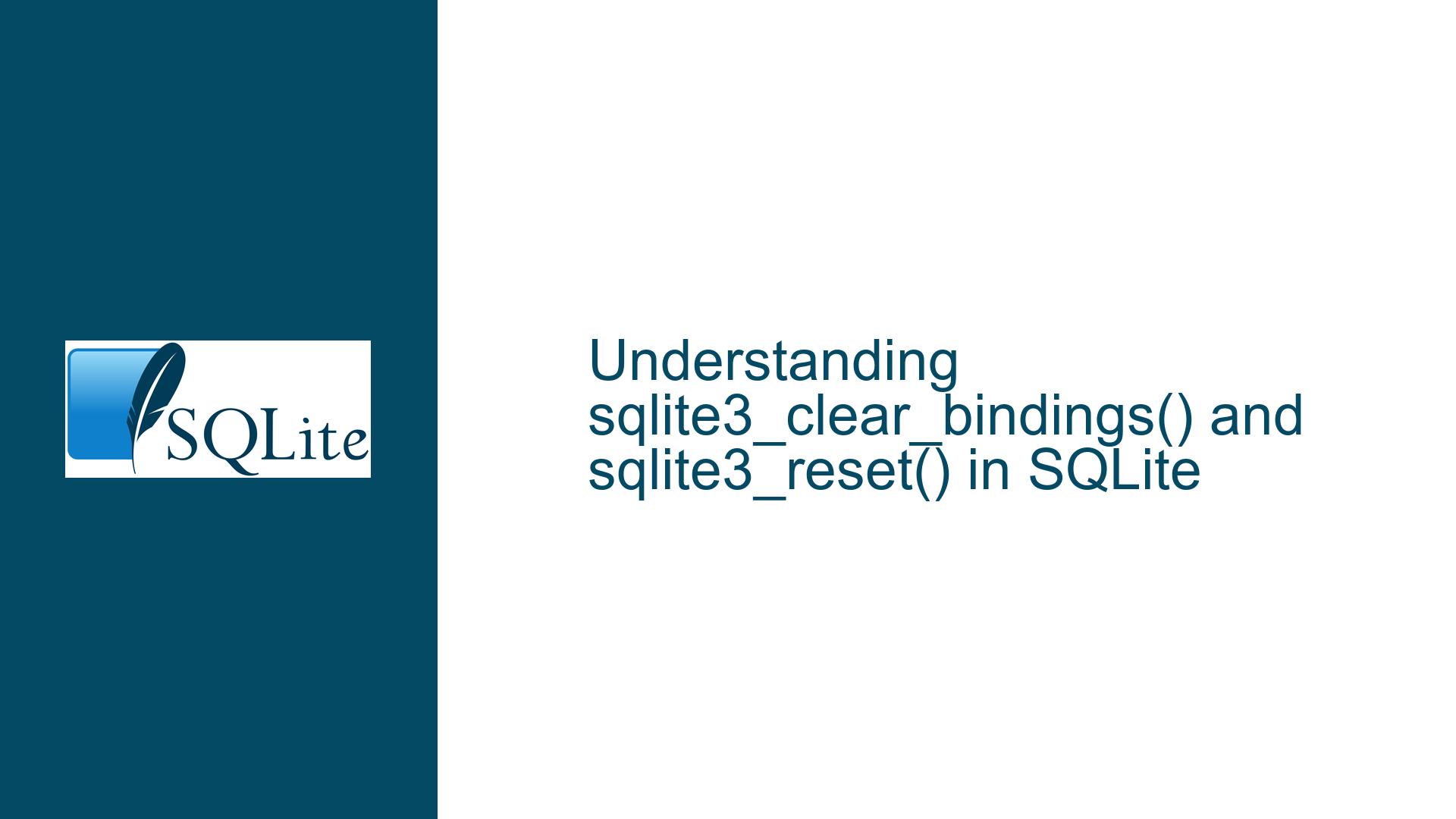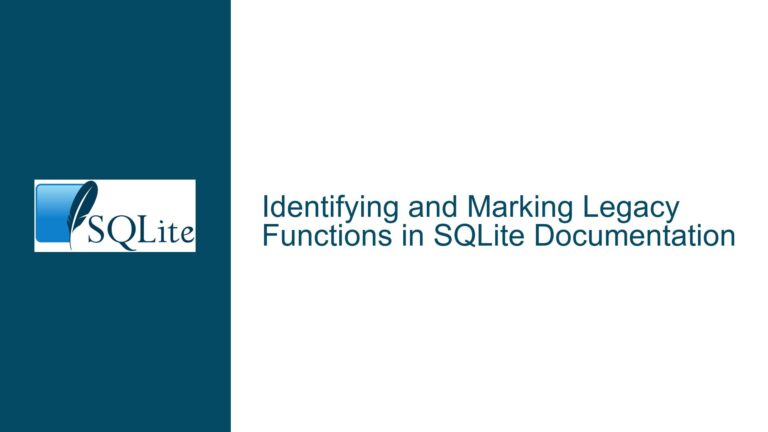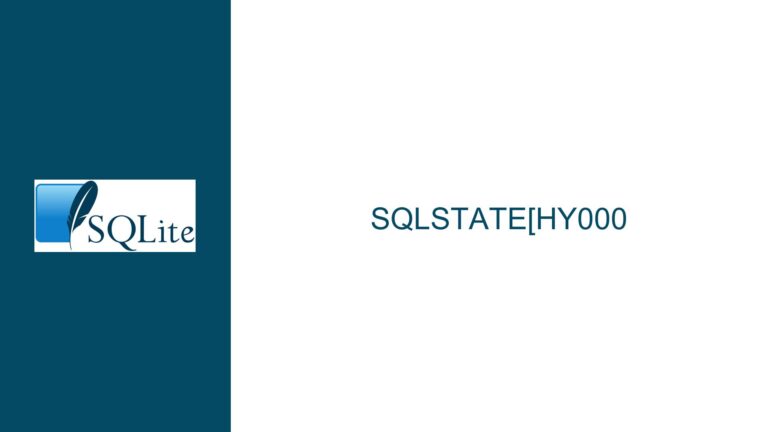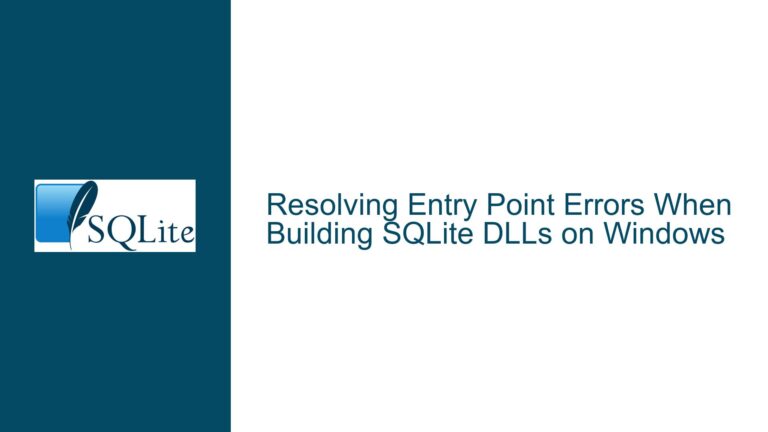sqlite3_clear_bindings() and sqlite3_reset() in SQLite
The Role of sqlite3_clear_bindings() in SQLite Prepared Statements
The function sqlite3_clear_bindings() is often misunderstood in the context of SQLite’s prepared statements. Prepared statements are a powerful feature in SQLite that allow for efficient execution of repeated SQL queries with different parameters. When a prepared statement is created using sqlite3_prepare_v2(), it can be executed multiple times with different bound parameters using the sqlite3_bind_*() family of functions. These functions bind values to the placeholders in the SQL statement, such as ?, :name, or @name.
The confusion arises when developers try to determine whether sqlite3_clear_bindings() is necessary after using sqlite3_reset(). The sqlite3_reset() function is used to reset a prepared statement back to its initial state, allowing it to be executed again. However, sqlite3_reset() does not clear the bound parameters. This means that if you do not explicitly clear the bindings, the same values will be used in subsequent executions of the prepared statement.
The sqlite3_clear_bindings() function is designed to clear all the bound parameters in a prepared statement, setting them to NULL. This can be useful in scenarios where you want to ensure that no residual values from previous executions affect the next execution of the prepared statement. However, it is important to note that sqlite3_clear_bindings() is not strictly necessary for the correct functioning of SQLite. It is a convenience function that can simplify code by ensuring that all parameters are reset to NULL before new values are bound.
Memory Management and Potential Leaks in SQLite Bindings
One of the concerns raised in the discussion is whether failing to call sqlite3_clear_bindings() before sqlite3_reset() could result in a memory leak. This concern stems from the fact that bound parameters may allocate memory, especially when binding large blobs or text values. If these bindings are not properly cleared, it might be assumed that the memory associated with them could be leaked.
However, this is not the case. SQLite’s memory management is designed to handle the lifecycle of bound parameters efficiently. When sqlite3_reset() is called, the prepared statement is reset, but the bound parameters remain intact. If the same prepared statement is executed again without clearing the bindings, the previously bound values will be reused. This does not result in a memory leak because SQLite internally manages the memory associated with the bound parameters.
The only scenario where a memory leak could occur is if the prepared statement itself is not finalized using sqlite3_finalize(). Finalizing a prepared statement releases all resources associated with it, including any memory allocated for bound parameters. Therefore, as long as sqlite3_finalize() is called when the prepared statement is no longer needed, there will be no memory leak, regardless of whether sqlite3_clear_bindings() is called.
Best Practices for Using sqlite3_clear_bindings() and sqlite3_reset()
Given that sqlite3_clear_bindings() is not strictly necessary, the decision to use it often comes down to coding style and specific use cases. Here are some best practices to consider:
Reusing Prepared Statements with New Parameters: If you are reusing a prepared statement and want to ensure that no residual values from previous executions affect the next execution, calling
sqlite3_clear_bindings()can be a good practice. This ensures that all parameters are reset toNULLbefore new values are bound.Performance Considerations: Clearing bindings can add a small overhead, especially if there are many parameters. If you are certain that all parameters will be explicitly bound with new values before the next execution, you can skip
sqlite3_clear_bindings()to avoid this overhead.Code Readability and Maintenance: Using
sqlite3_clear_bindings()can make the code more readable and easier to maintain, as it explicitly indicates that all parameters are being reset. This can be particularly useful in complex codebases where the flow of data is not immediately obvious.Handling NULL Values: If your application logic requires that certain parameters be set to
NULLunder specific conditions, usingsqlite3_clear_bindings()can simplify the code. Instead of manually setting each parameter toNULL, you can clear all bindings and then bind only the necessary values.Debugging and Testing: During debugging and testing, using
sqlite3_clear_bindings()can help ensure that no unexpected values are carried over from previous executions. This can make it easier to identify and fix issues related to parameter binding.
In conclusion, while sqlite3_clear_bindings() is not required for the correct functioning of SQLite, it can be a useful tool in certain scenarios. Understanding when and why to use it can help you write more efficient and maintainable code. Always remember that the key to avoiding memory leaks in SQLite is to properly finalize prepared statements, not necessarily to clear bindings before resetting them.






